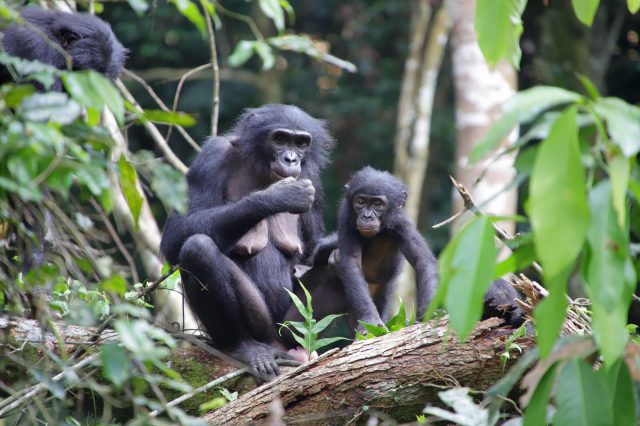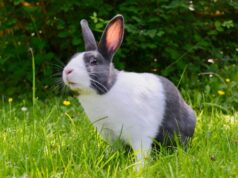Scientists have witnessed bonobo apes adopting infants who were born outside of their social group for the first time in the wild.
Researchers, including psychologists at Durham University, UK, twice saw the unusual occurrence among bonobos in the Democratic Republic of Congo, in central Africa.
They say their findings give us greater insight into the parental instincts of one of humans’ closest relatives and could help to explain the emotional reason behind why people readily adopt children who they have had no previous connection with.
The research, led by Kyoto University, in Japan, is published in the journal Scientific Reports.
Researchers observed a number of bonobo groups over several years in the Wamba area of the Democratic Republic of Congo.
Find your dream job in the space industry. Check our Space Job Board »
The examples of cross-group adoption were seen between April 2019 and March 2020 before COVID-19 restrictions brought observations to a temporary halt.
Chio, aged between 52 to 57 years old, who is thought to be post-menopausal, was seen to adopt three-year-old Ruby who had been part of another unknown group.
Marie, an 18-year-old bonobo was also seen to adopt Flora, who is estimated to be two-and-a-half-years-old, after Flora’s mother disappeared from a separate group.
Neither Chio nor Marie, who had already had their own offspring, had any pre-existing family connections to the adopted infants or any strong social connections with the youngsters’ biological mothers, yet both readily adopted the young bonobos.
Both adoptive mothers carried, groomed, nursed, and shared food with their adopted young. Ruby and Flora were also both observed suckling at their adopted mothers. In the case of Ruby, she might have been suckling for comfort as Chio is unlikely to have been producing milk.
The researchers say this caring nature is evidence of bonobos’ strong attraction to infants and high tolerance of individuals, including immature youngsters, from outside of their normal group.
Bonobos, along with chimpanzees, are humans’ closest relatives and the researchers say their discovery helps us to understand adoption among people.
Marie-Laure Poiret, a Ph.D. Research Student, in the Department of Psychology, at Durham University, UK, said: “Usually in wild animals adoptive mothers are related to orphaned infants or sometimes young females will adopt orphans to improve their own care-giving behaviours, which increases the future survival chances of their own offspring.
“This means that adoption in non-human animals can usually be explained by the adoptive mother’s own self-interest or pre-existing social relationships.
“The cross-group adoption we have seen in the cases of both Chio and Ruby, and Marie and Flora, is as surprising as it is wonderful and perhaps helps us explain adoption among humans, which cannot be explained purely by the benefits received by adoptive mothers.
“Instead it is fair to say from the examples we have seen in bonobos that adoption in humans can be explained by a selfless concern for others and an emotional desire to offer care to someone who we have no previous connection with.”
The bonobo groups included in this study have been observed by scientists since the 1970s and researchers have come to know the individuals in each of the groups.
Research lead author Nahoko Tokuyama, Assistant Professor in the Primate Research Institute and Wildlife Research Centre at Kyoto University, Japan, who has spent more than ten years studying bonobos in the Democratic Republic of Congo, said bonobos “never ceased to amaze”.
Dr. Tokuyama added: “Although cases of adoption were observed in non-human primates, the adoptive mother and adoptees almost exclusively belonged to the same social group.
“This may be because adoption is very costly behavior and because non-human primates form stable groups and have a good ability to recognise other group members.
“It’s well known that groups of bonobos sometimes encounter and associate with each other, and that those belonging to different groups can interact tolerantly.
“However, I had never imagined that bonobos could adopt infants from outside of their groups, so these cases were quite surprising.”
The researchers plan to continue their observations of the bonobo groups once COVID-19 restrictions allow.
Provided by: Durham University
More information: Nahoko Tokuyama et al. Two wild female bonobos adopted infants from a different social group at Wamba. Scientific Reports (2021). DOI: 10.1038/s41598-021-83667-2
Image: Marie grooming Flora.
Credit: Nahoko Tokuyama.











